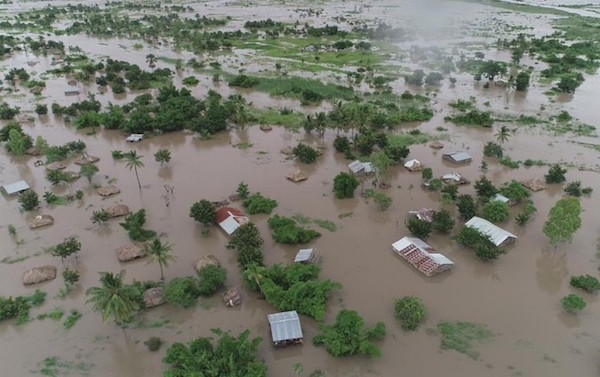Zimbabwe
See the following -
2015 Was a Good Year for Creating the World's 'Missing Maps' with OpenStreetMap
 The Missing Maps project, which launched in 2014, aims to literally and figuratively put more than 20-million at-risk people on the map using OpenStreetMap (OSM) as a platform. We need to fill in "missing maps" before the next disaster strikes, ensuring the maps have detail sufficient for emergency responders to hit the ground running. OpenStreetMap is an open and free source of geographic data. Anyone with a username can add, edit, or update data, so the Missing Maps project is community driven and focuses on local knowledge. Remote volunteers around the world use satellite imagery to trace features, such as roads and buildings. Community members and volunteers in the area then use the base map to add local data to these shapes, including street names, addresses, building types, and points of interest. As we look back at 2015, here are a few success stories from the Missing Maps project...
The Missing Maps project, which launched in 2014, aims to literally and figuratively put more than 20-million at-risk people on the map using OpenStreetMap (OSM) as a platform. We need to fill in "missing maps" before the next disaster strikes, ensuring the maps have detail sufficient for emergency responders to hit the ground running. OpenStreetMap is an open and free source of geographic data. Anyone with a username can add, edit, or update data, so the Missing Maps project is community driven and focuses on local knowledge. Remote volunteers around the world use satellite imagery to trace features, such as roads and buildings. Community members and volunteers in the area then use the base map to add local data to these shapes, including street names, addresses, building types, and points of interest. As we look back at 2015, here are a few success stories from the Missing Maps project...
- Login to post comments
30 Brilliant African Tech Startups
The secret is out. Wired likens the opportunities in Africa to those of the pre-dotcom boom in 1995. Says the magazine: “If you want to become extremely wealthy over the next five years, and you have a basic grasp of technology, here’s a no-brainer: move to Africa.” Read More »
- Login to post comments
Africa’s Tech Edge
How the continent's many obstacles, from widespread poverty to failed states, allowed African entrepreneurs to beat the West at reinventing money for the mobile age
- Login to post comments
CAT-Zim SACMA Launch Zimbabwe’s Own Version Of USHAHIDI
Southern Africa Crisis Management Agency (SACMA) and Christian Action Trust Zimbabwe (CAT-Zim) have come together to launch a grassroots anchored peace initiative ahead Zimbabwe’s watershed elections this year. Read More »
- Login to post comments
Crowdsourcing Gaining Momentum in Africa
In Africa, we are also seeing some innovative ways in which crowdsourciing is being utilised. In Kenya for example, Ushahidi put Africa’s crowdsourcing on the map, as its platform was effectively used to monitor the 2002 Kenya elections...Closer to home in Kubanata, a Zimbabwean human rights and civic organization leveraged crowdsourcing to gather information to map the Typhoid cases in Zimbabwe, providing critical data to assist with managing the epidemic.
- Login to post comments
FrontlineSMS, Human Usability, and the Missing Middle Mile
 FrontlineSMS started in 2005 with what seemed like a simple, clear ambition: make a tool that makes it easy for offline communities to communicate. The goal wasn’t innovation or profit, it was simply to get a useful tool into the hands of as many people as possible...Looking back, it feels naive to think that it could ever be simple—that delivering usable, open source, multi-channel tools that drive measurable, positive outcomes through text messaging could have ever felt inevitable. Nine years and many iterations (and tens of thousands of users) later, though, we’re more successful than ever—and mostly for unexpected reasons...
FrontlineSMS started in 2005 with what seemed like a simple, clear ambition: make a tool that makes it easy for offline communities to communicate. The goal wasn’t innovation or profit, it was simply to get a useful tool into the hands of as many people as possible...Looking back, it feels naive to think that it could ever be simple—that delivering usable, open source, multi-channel tools that drive measurable, positive outcomes through text messaging could have ever felt inevitable. Nine years and many iterations (and tens of thousands of users) later, though, we’re more successful than ever—and mostly for unexpected reasons...
- Login to post comments
Harness Phone Potential: RAS
Ken Banks, who invented a cell phone messaging service which has revolutionised how people communicate with one another in developing countries, said: “People are using mobile phones to lift themselves out of poverty by creating small businesses.” He spoke about how entrepreneurs, from cities to rural areas, were using cell phones in ingenious ways, to transfer money, deliver important pub Read More »
- Login to post comments
How Can Information and Communications Tech Help in Disaster Preparedness and Response?
 n the immediate aftermath of disasters, timely and effective information is critical for the decision-making process. Information and Communication Technologies (ICTs) play a significant role in mitigation, preparedness, response, and rehabilitation by facilitating the flow of vital information in a timely manner. To deliver and deploy telecommunications / information and communication resources (transportable, easy to deploy and reliable systems that are non-exclusive) in a timely manner in the event of disasters, the ITU has designed the ITU Framework for Cooperation in Emergencies (IFCE). Innovative technologies such as robotics, drone technology, GIS, and emerging technologies like artificial intelligence (AI), the Internet of Things (IoT), cloud computing and Big Data are transforming the complex process of disaster management.
n the immediate aftermath of disasters, timely and effective information is critical for the decision-making process. Information and Communication Technologies (ICTs) play a significant role in mitigation, preparedness, response, and rehabilitation by facilitating the flow of vital information in a timely manner. To deliver and deploy telecommunications / information and communication resources (transportable, easy to deploy and reliable systems that are non-exclusive) in a timely manner in the event of disasters, the ITU has designed the ITU Framework for Cooperation in Emergencies (IFCE). Innovative technologies such as robotics, drone technology, GIS, and emerging technologies like artificial intelligence (AI), the Internet of Things (IoT), cloud computing and Big Data are transforming the complex process of disaster management.
- Login to post comments
Why African Countries Need to Invest in Research and Citizen Science
 Climate change, HIV/AIDS, recurring droughts, and food insecurity are some of the most pressing issues the African continent has had to deal with in 2016. These issues pose a significant threat to economic, social and environmental development in Africa and create health and economic challenges to the continent. Yet, all of these challenges can benefit from research results spinning off from African universities and research institutions. But to get these results, the institutions must have the funds...
Climate change, HIV/AIDS, recurring droughts, and food insecurity are some of the most pressing issues the African continent has had to deal with in 2016. These issues pose a significant threat to economic, social and environmental development in Africa and create health and economic challenges to the continent. Yet, all of these challenges can benefit from research results spinning off from African universities and research institutions. But to get these results, the institutions must have the funds...
- Login to post comments